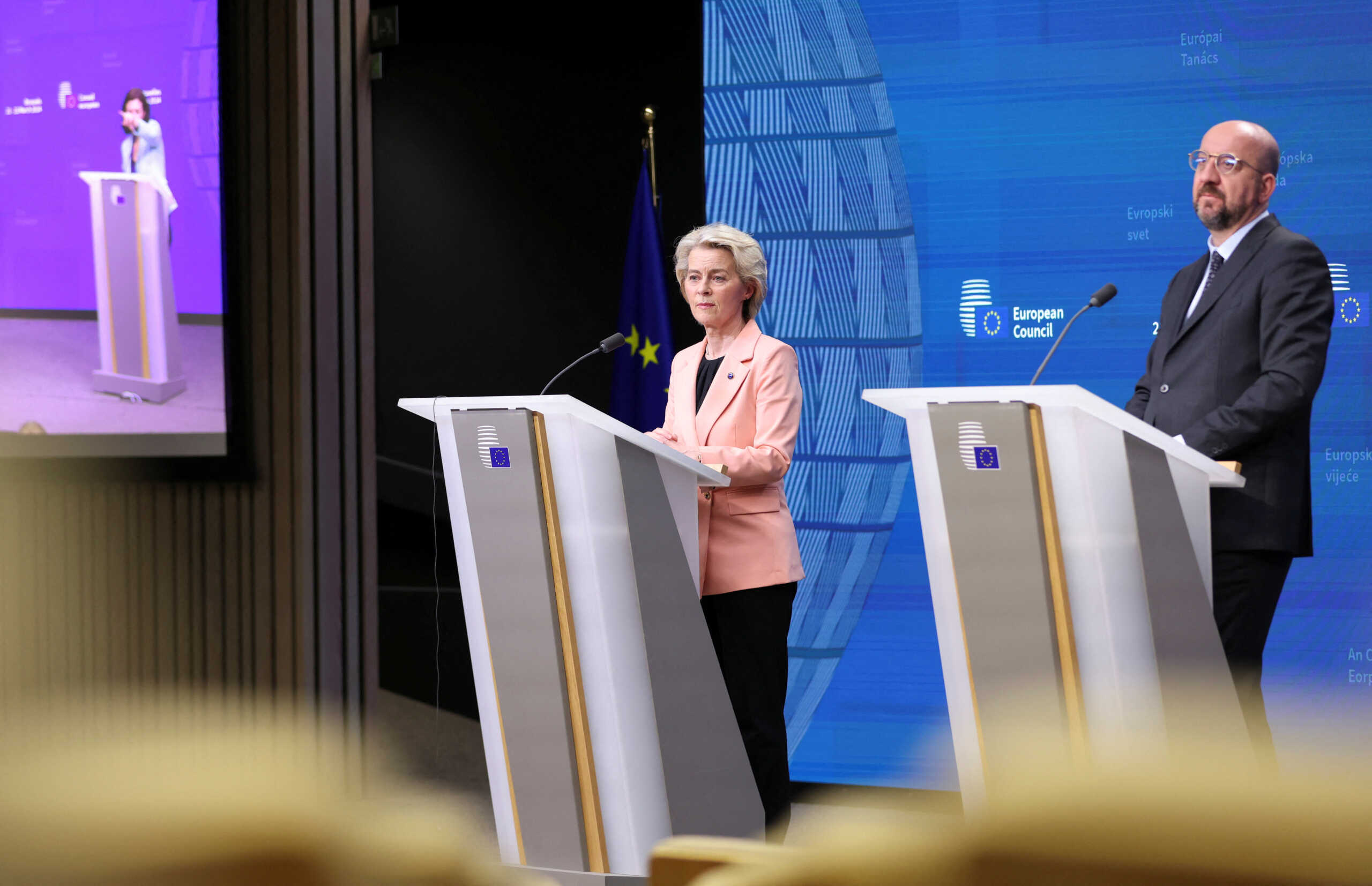
The summit of 27 European Union leaders decided to move towards using windfall proceeds from “frozen” Russian assets for the benefit of Ukraine, including the possibility of financing European military support for Kiev.
This was highlighted in the European Council conclusions on Ukraine. During a press conference shortly after the end of the first day of the summit, European Commission President Ursula von der Leyen said: The European Union is likely to be ready to distribute the first billion (euro) of profits from frozen Russian assets to support Ukraine in early July.
“There is already strong support for the use of excess profits from frozen Russian assets for military purposes by Ukraine,” he said. Ursula von der Leyen. “I told the leaders that if we move quickly now to complete the proposal, we can disburse the first billion as early as July 1. It depends on us if we move quickly,” the Commission President stressed.
For his part, the President of the European Council said: “I am confident that we are able to move very quickly and put this mechanism into effect.” Charles Michel. Charles Michel said that the European Council supported the proposal presented by the Commission and the Belgian presidency confirmed that the intention is to work very quickly in this direction. He added that it is important to be able to use these funds to purchase defense equipment for Ukraine.
Regarding the need to protect European defenseThe Commission President stated that the defense industry, as a single market industry, can be supported by the European Commission to strengthen different sectors. Referring to the Defense Industrial Strategy recently presented by the European Commission, Ursula von der Leyen highlighted the potential for member states to move towards joint procurement and better procurement. He also stressed that strengthening the industrial base will give impetus to research and development in the field of new technologies. “Right now, that's what we're trying to do, to have a mechanism whereby we'll not only be able to get better supplies quickly,” he added.
Finally, Ursula von der Leyen said that the issue of European defense needs “full and complete attention.” So, He suggested that the next Commission should have a Defense Commissioner dealing specifically with this very important part of our common market.
What do the conclusions say?
The European Union is committed to increasing its overall defense readiness and defense capabilities to meet its needs and ambitions in the context of increasing security threats and challenges, in accordance with the outcomes of the Security and Defense Summit.
Based on the Versailles Declaration and the Strategic Compass, it is committed to reducing its strategic dependencies and increasing its capabilities.
The European defense technological and industrial base must be strengthened accordingly across the EU. Increasing defense readiness and strengthening Union sovereignty will require additional efforts, in accordance with the competences of Member States, to:
a) Deliver on the shared commitment to significantly increase defense spending and invest better and faster together;
b) Improving the European defense industry's access to public and private financing. In this context, the European Council calls on the Council and the Commission to explore all options for mobilizing financing and to submit a report by June. In addition, the EIB is called upon to adjust its lending policy to the defense industry and the current definition of dual-use goods, while maintaining its financing capacity.
c) stimulate joint development and procurement to address critical gaps in EU capabilities, particularly in strategic areas, as well as to take full advantage of synergies between national and European defense planning processes;
d) Promoting cooperative/joint defense investments, from R&D at the design stage, through to joint manufacturing and procurement, and improving predictability, for example. Through fixed, multi-year contracts,
e) Increasing the flexibility, resilience and capacity of the European defense industry to develop and produce innovative defense products, enhancing interoperability and interchangeability and ensuring their availability in Member States;
(f) Encouraging further integration of the European defense market across the Union, facilitating access to defense supply chains, in particular for SMEs and medium-sized enterprises, and reducing red tape;
(g) Promoting rapid response and early identification of bottlenecks in defense market supply chains and ensuring that EU legislation does not stand in the way of the development of the European defense industry;
h) Support initiatives to continue investing in the skilled workforce to address the current workforce and skills shortage in the defense industry.
The Council, the High Representative and the Commission are called upon to accelerate work on joint communications on the European Defense Industrial Strategy (EDIS). The Council is also called upon to proceed without delay with work on the accompanying proposal for the European Defense Industrial Program (EDIP).
It has been stressed that the implementation of the Strategic Compass remains an essential element in increasing Europe's defense preparedness, and must be accelerated. The EU's capacity for rapid deployment, military mobility, exercises, enhancing space security, countering cyber and hybrid threats, and countering foreign intelligence manipulation and interference (FIMI) are particularly important dimensions in this regard.
A stronger and more capable European Union in the field of security and defense will make a positive contribution to global and transatlantic security and will be complementary to NATO, which remains the basis of the collective defense of its members, according to the conclusions.
It is emphasized that the specific nature of the security and defense policy of some Member States is not affected, and the national security and defense interests of all Member States are taken into account.

“Hipster-friendly coffee fanatic. Subtly charming bacon advocate. Friend of animals everywhere.”





More Stories
F-16 crashes in Ukraine – pilot dies due to his own error
Namibia plans to kill more than 700 wild animals to feed starving population
Endurance test for EU-Turkey relations and Ankara with Greece and Cyprus